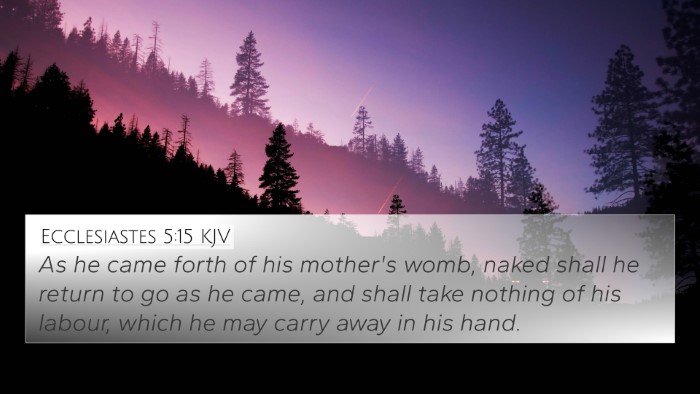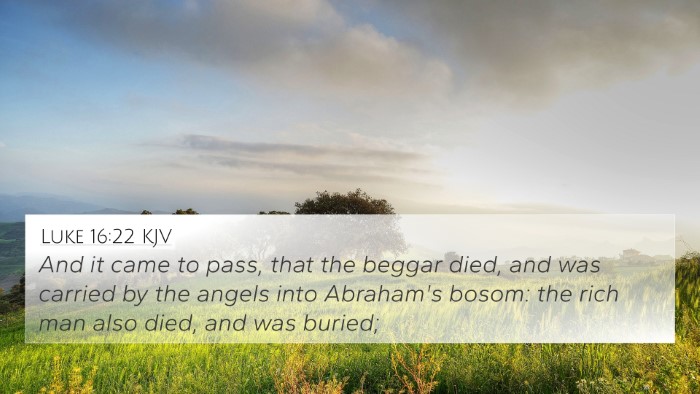Understanding 1 Timothy 6:7
Verse: “For we brought nothing into this world, and it is certain we can carry nothing out.” (1 Timothy 6:7)
This verse underscores the transient nature of earthly possessions and the inevitability of leaving them behind upon death. In this reflection, we summarize insights from renowned public domain commentaries to provide a comprehensive understanding of its implications.
Commentary Insights
Matthew Henry's Commentary
Matthew Henry emphasizes the futility of materialism, pointing out that our origins are void of possessions. He explains that human lives begin with nothing, highlighting that wealth cannot accompany us to the afterlife. This serves to remind believers to focus on spiritual wealth rather than earthly riches.
Albert Barnes' Notes
Albert Barnes expands on the idea of life's brevity. He notes that while people may strive for wealth during their lives, they should acknowledge its ultimate insignificance. Barnes posits that this understanding should drive Christians towards an attitude of contentment, as everything we acquire is temporary.
Adam Clarke's Commentary
Adam Clarke provides a detailed reflection on the ramifications of entering the world empty-handed. He asserts that the pursuit of material things is futile in the grand scheme of existence. Clarke encourages believers to invest in their spiritual lives, noting that true gain comes from godliness, which lasts beyond this life.
Thematic Connections
This verse has significant thematic ties throughout Scripture, emphasizing the relationship between earthly matters and spiritual truths. Below are several Bible verses that share connections with 1 Timothy 6:7:
- Job 1:21: “Naked I came from my mother’s womb, and naked I shall return there.”
- Psalm 49:17: “For when he dies he shall carry nothing away; his glory shall not descend after him.”
- Ecclesiastes 5:15: “As he came from his mother’s womb, so shall he return, to go as he came.”
- Luke 12:15: “Take heed and beware of covetousness, for one’s life does not consist in the abundance of the things he possesses.”
- Hebrews 13:5: “Let your conduct be without covetousness; be content with such things as you have.”
- Matthew 6:19-20: “Do not lay up for yourselves treasures on earth… but lay up for yourselves treasures in heaven.”
- 1 Corinthians 15:47-48: “The first man was of the earth, made of dust; the second Man is the Lord from heaven.”
Application for Believers
In light of the teachings in 1 Timothy 6:7, Christians are encouraged to:
- Reflect on Spiritual Wealth: Believers should seek treasures that hold eternal value, focusing on spiritual growth and community rather than abundance in material possessions.
- Cultivate Contentment: The pursuit of contentment amidst life’s challenges, as urged by the commentary insights, is vital to a fulfilling Christian life.
- Practice Generosity: Understanding the fleeting nature of material wealth should lead to charitable actions, sharing resources with those in need.
Cross-Referencing Biblical Texts
By engaging in a cross-reference Bible study, believers can deepen their understanding of wealth, responsibility, and the transient nature of life. Below are some resources to assist with this:
- Bible Concordance: Essential for identifying keywords that help cross-reference themes throughout the Bible.
- Bible Cross-Reference Guide: A practical resource to navigate through scriptural connections.
- Cross-Referencing Bible Study Methods: Strategies and techniques to effectively study scriptures in relation to one another.
Conclusion
1 Timothy 6:7 serves as a profound reminder to believers of the temporary nature of earthly possessions. Engaging in a comprehensive analysis of this verse through thematic Bible verse connections and cross-references allows a richer interpretation and a deeper appreciation for spiritual truths. By recognizing this fundamental reality, believers are encouraged to invest their lives in pursuits that carry eternal significance.








